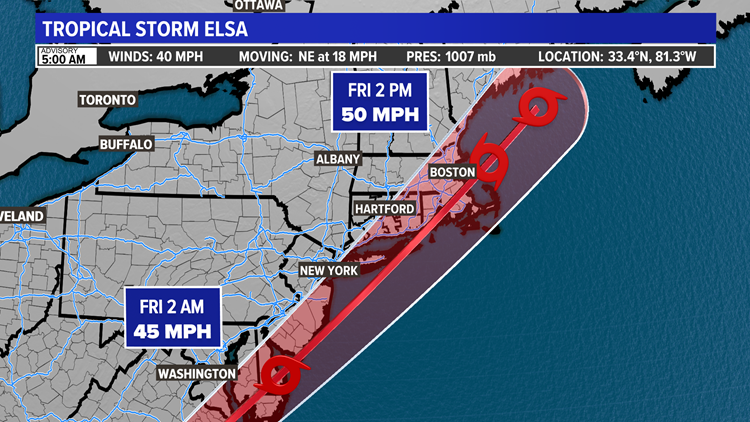HARTFORD, Conn. — Tropical Storm Elsa is making its way over to Connecticut, set to bring rain and wind Friday morning.
A Tropical Storm Warning has been issued for the south-eastern part of the state.
Don't know the difference between a watch and a warning? A Tropical Storm Watch indicates tropical storm conditions (sustained winds of 39 to 73 mph) are possible within the specified area within 48 hours.
A Tropical Storm Warning indicates that tropical storm conditions (sustained winds of 39 to 73 mph) are expected within your area within 36 hours.
Regardless if it's a hurricane or a tropical storm, it's always good to be prepared to keep you and your family safe.
The National Weather Service (NWS) and the Centers for Disease Control (CDC) has some tips on what you can do:
From the NWS:
- Know your zone: Do you live near the Gulf or Atlantic Coasts? Find out if you live in a hurricane evacuation area by contacting your local government/emergency management office or by checking the evacuation site website.
- Put Together an Emergency Kit: Put together a basic emergency. Check emergency equipment, such as flashlights, generators and storm shutters.
- Write or review your Family Emergency Plan: Before an emergency happens, sit down with your family or close friends and decide how you will get in contact with each other, where you will go, and what you will do in an emergency. Keep a copy of this plan in your emergency supplies kit or another safe place where you can access it in the event of a disaster. Start at the Ready.Gov emergency plan webpage.
- Review Your Insurance Policies: Review your insurance policies to ensure that you have adequate coverage for your home and personal property.
- Understand NWS forecast products, especially the meaning of NWS watches and warnings.
- Preparation tips for your home from the Federal Alliance for Safe Homes
- Preparation Tips for those with Chronic Illnesses
Learn more on the NWS website.
From the CDC:
- Prepare for a Hurricane: Take basic steps now to ensure your safety should a storm hit.
- Get emergency supplies: Stock your home and your car with supplies.
- Make a plan: Create a family disaster plan.
- Prepare to Evacuate: Never ignore an evacuation order.
- Protect older adults: Understand older adult health and medical concerns.
- Protect your pets: Ensure your pet’s safety before, during, and after a hurricane.
The CDC also recommends that you print important documents (e.g., emergency phone numbers, insurance information) before a hurricane strikes. Power outages during and after a hurricane can prevent you from accessing information online when you most need it.
Learn more on the CDC's website.
Fire officials remind people that if they lose power and light a candle to remember to blow out the flame before leaving the room, or just use flashlights if available.
What do you if a tree falls down on your property, house, or car? Who pays for it? Here's what AAA has to say:
Vehicles
- Physical damage to a car caused by heavy wind or fallen tree limbs is covered under the optional comprehensive portion of an auto policy.
- If your car is damaged by a fallen tree or limbs, you would need to file a claim using your vehicle policy’s comprehensive coverage.
Homes
- If your tree falls on your house, your insurance will cover removal of the tree and home repairs due to damage.
- If your tree falls on your neighbor’s house, your neighbor’s homeowner’s policy would provide insurance coverage. The same holds true if your neighbor’s tree falls on your home; you would file a claim with your own insurance company.
- If a tree falls in your yard, but doesn’t hit anything, you would pay for its removal in most cases.
- Additionally, if a tree on your property is weak, damaged, or decayed, but you do nothing about it, and it crashes down on a neighbor’s home (or vehicle), you could be held liable for damages.
- Wind-related damage to a house, its roof, its contents and other insured structures on the property is covered under standard homeowner’s insurance policies. Wind-driven rain that causes an opening in the roof or wall and enters through this opening is also covered.
- Damage to a house and its contents caused by a collapse is covered under standard homeowners insurance policies.
AAA Insurance recommends these tips to help the claims process go smoothly:
- Take appropriate immediate and temporary measures to prevent further damage. If you do make minor repairs before an insurance adjuster arrives, save receipts to submit for reimbursement.
- Phone your insurance company immediately. Be prepared with a list of questions ahead of time: Am I covered? Does my claim exceed my deductible? How long will it take to process my claim? Will I need to obtain estimates for repairs to structural damage?
- If your home is damaged to the extent you cannot live there, find out if you have coverage for additional living expenses for accommodations while repairs are completed. If you do stay at a hotel, keep your receipts for reimbursement.
- Schedule a time for an adjuster to inspect the damage to your property.
- Prepare a list of lost or damaged articles. Avoid throwing out damaged items until the adjuster has visited. Consider photographing or videotaping the damage.
- Get claim forms. Insurance companies will send required claim forms by a specified time period. Be sure to completely fill out the form and return promptly to avoid delays.
HERE ARE MORE WAYS TO GET FOX61 NEWS
Download the FOX61 News APP
iTunes: Click here to download
Google Play: Click here to download
Stream Live on ROKU: Add the channel from the ROKU store or by searching FOX61.



